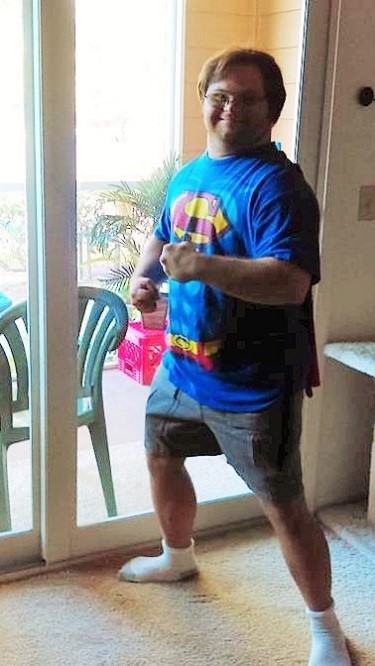KARL HUNT – SUPERHERO OF FAIR HOUSING
By: Matthew Dietz
Litigation update of A Mother of an Adult with Down Syndrome’s Worst Nightmare
In November of 2014, I described a horrible incident where a property management company attempted to evict Karl Hunt, and his mother Dyan, from their home of six years. On February 18, 2016, the Eleventh Circuit Court of Appeals issued an opinion finding that Karl and Dyan are protected from discrimination due to assumptions or stereotypes about Karl’s disability and that he should not be treated any differently from any other person because of his disability.
In 2012, Karl, a 23 year old man who lives with Down Syndrome, spent his day at his home in Reflections at West Palm Beach where he listened to Disney sing-a-long and Pokémon

Karl Hunt and Pokemon
songs on his headphones while his mother worked. During the day, the property manager would constantly yell at Karl and demand that he leave the pool area or the community room, and unbeknownst to his mother, Karl was used to perform tasks around the development, such as cleaning bathrooms, taking out the trash, and other jobs in the community, without being paid.
On August that year, Karl went to the property manager’s office and described what was occurring in his favorite Japanese anime cartoon television series called Fullmetal Alchemist. While explaining the cartoon in the office, he drew on a map of the property and the property manager thought he said that he was going to sacrifice her, and then trap all of the residents in their apartments and set the property on fire.

Karl Hunt and Pokemon
The property manager spoke to Karl’s mother, Dyan, and said that this behavior was unacceptable and they would need to move. Dyan pleaded with her that this was a misunderstanding, and Karl could not explain the cartoon adequately because of his disability, she even offered to send Karl to a facility during the day when she worked. However, the property manager set into motion the non-renewal of her lease and even called the police so that if Karl went into the common areas of the development, he would be arrested. The police man scared Karl and Karl thought he was going to go to jail if he went outside of his home. Dyan sold and packed up her belongings and was prepared to leave, when Disability Independence Group told her that this was a violation of her son’s rights under the Fair Housing Act.
Disability Independence Group filed a complaint on behalf of Dyan and Karl Hunt under the Fair Housing Act, which prohibits discrimination against persons with disabilities. We alleged as follows:
- Karl could not be evicted because of his disability, unless the development could prove that he was a real and substantial danger to others.
- Karl could not be denied the privileges and benefits of being a tenant because of his disability, which included being chased away or barred from the common areas, or being required to do work around the property without consent.
- In a last ditch effort to remain on the property, Dyan asked for a reasonable accommodation for Karl to go in a day center while she worked, and then she could supervise him at night. This request was not considered by the management.
In November of 2014, the District Court Judge dismissed the action finding that Dyan and Karl did not state a claim under the Fair Housing Act because Karl and his mother were required to ask for an accommodation prior to the events in the property manager’s office, and the request before the non-renewal was not sufficient. Further, the court found that the actions against Karl in being barred from areas of the property or being required to work were not sufficient to state a claim. Disability Independence Group appealed on Karl and Dyan’s behalf to the Eleventh Circuit Court of Appeals.
On February 18, 2016, the Court of Appeals ruled overwhelmingly in Karl’s favor and reversed the district court’s decision on all grounds. They remanded it back to the lower court and provided the district court, and all other courts in the Eleventh Circuit, detailed instructions in the law regarding disability discrimination claims in housing. The entire decision is here.

Appellate Team – (L-R) Sam Rony, Rachel Goldstein, Karl Hunt, Dyan Hunt, Matthew Dietz, and Jennifer Hunt
THE FIRST VIOLATION of the Fair Housing Act were the actions that were taken by the property management to deny Karl and Dyan a lease renewal of their apartment.
The Fair Housing Act prohibits the “denying or making a dwelling unavailable for rental” because of a disability. To state a claim, the 11th Cir. found that “a complaint must allege that the adverse action was taken because of a disability and state the facts on which the plaintiff relies to support that claim.” The 11th Cir. found the following adverse action:
Despite the fact that the Hunts intended to renew the lease and were qualified to do so, Aimco allegedly refused to allow the Hunts to continue renting the apartment. The Hunts were given notice to vacate the apartment on a date certain.
Then the 11th Cir. found that the action was taken because of a disability, as follows:
Moreover, the Hunts pled that Aimco took adverse action against them because of Karl’s disability. The Hunts alleged that “Aimco treated Karl Hunt differently solely because of his disability and did not want him residing at Reflections.” Id. ¶ 53. Even though Dyan described to Ms. Jackson how Karl’s disability could cause misunderstandings such as the perceived threat, Ms. Jackson disregarded her explanations and continued the eviction process.
Further, the Court also found that it did not matter whether the property management was successful in its attempts to evict or to deny a lease to Karl and Dyan and found that the failure for the property management to be successful in their discriminatory acts does not “wipe out the need for consideration of damages.”
In addition, whether or not Karl was a threat to anyone’s safety is a defense of the property management that they are required to plead and prove with individualized assessment of Karl’s behavior that is based on reliable objective evidence and must consider: (1) the nature, duration, and severity of the risk of injury; (2) the probability that injury will actually occur; and (3) whether there are any reasonable accommodations that will eliminate the direct threat. The determination cannot be made on stereotypes or assumptions of a person’s disability.
THE SECOND VIOLATION of the Fair Housing Act were the actions that were taken by the property management with the discrimination in the terms and conditions of housing to which Karl was subject because of his disability.
Because of Karl’s disability, he was bullied by the property management. This included the management yelling at him and chasing him away from common areas, making him do maintenance work around the complex, and barring him from the community rooms and the office. Further, the 11th Cir. found that it “was a distinction without a difference” that the police were used to threaten Karl not to enter private areas. As stated by the Court, “A private entity may not use the police as a front for discrimination.”
THE THIRD VIOLATION of the Fair Housing Act were the actions that were taken by the property management in disregarding Dyan Hunt’s request for a reasonable accommodation to place Karl in a day care center while she was at work so he would be not be at the complex in the day and she would supervise him at night.
The request for accommodation does not need to be in any specific “magic” words, but only needs to provide sufficient information for the property manager to “know of both the disability and desire for an accommodation” and the “circumstances must at least be sufficient to cause a reasonable [housing provider] to make appropriate inquiries about the possible need for an accommodation.”
In Karl’s case, the 11th Cir. found the following facts sufficient:
Dyan told the property manager that she would look for a facility that would take care of Karl during the day while she was away at work to prevent any more incidents. It is clear from the context that Dyan communicated that she was attempting to make these arrangements for the express purpose of avoiding future conflict as a result of Karl’s disability. We conclude that these factual allegations were sufficient to plead that Dyan sought an accommodation in the form of an exception to Aimco’s apparent policy or practice of not renewing the leases of tenants who make threats.

Karl Hunt and Pokemon
What’s next?
This opinion by the 11th Circuit Court of Appeals does not mean that Karl wins in case, but instead, it means that he has the opportunity to prove his case before a jury and have a jury decide if what the property management did was discrimination based upon his disability. But what makes Karl (and Dyan) a superhero is that that they stood up for their rights and held firm despite the hardship in doing so. They paved the way for many other persons with intellectual or developmental disabilities to live in their homes, and not to get bullied or evicted because of their disabilities.













